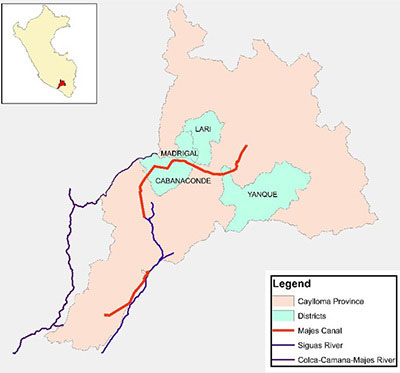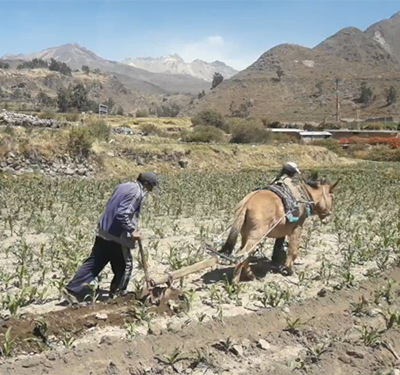Researchers Share Lessons Learned From Peru's Water Management Program
Learning, as defined by Ababacar Mbengue and Sedou Sané, is the ability to "detect errors and correct them by changing [one's] theory of action. But what happens when that learning does not produce the expected outcome?
Dr. Zhao Ma and former postdoctoral researchers Ruxandra Popovici and Anna Erwin recently published their findings regarding the case of decision makers and water users in Peru in an article titled "Maladaptive learning in Peru's integrated water resources management" in Environmental Science and Policy (Volume 127, Jan. 2022, Pages 209-217).
The research team, which also included department chair of Horticulture and Landscape Architecture Dr. Linda Prokopy at Purdue as well as Carlos Renzo Zeballos Velarde, Edwin Fredy Bocardo Delgado and Jose Porfirio Pinto Cáceres, all at the Universidad Nacional de San Agustin in Arequipa, Peru, found that adaptation does not always lead to positive outcomes.

"We found that participatory processes, in our case in-person meetings between decision makers and water users in Peru, do not automatically lead to positive outcomes in water resources management," Popovici said. "We found that, through in-person meetings, stakeholders learned to withhold information from each other rather than sharing information and coming to joint solutions."
Researchers studied the interaction between two groups of stakeholders in a government-led Integrated Water Resources Management (IWRM) program in Peru's Colca Valley:Map of the Colca Valley in Peru where research on water management took place. local water users at the community level, and regional water agency officials. Through 90 interviews with water users in three communities - in the Lari, Yanque and Cabanaconde districts - as well as with water agency officials at the National Water Authority Autoridad Nacional del Agua (ANA) and through participant observation at meetings, researchers found that both groups adapted in ways that reinforced the disconnect between regional water agencies policies and practices and local water users' constraints. This phenomenon, which leads to outcomes that are mutually non-beneficial for both stakeholder groups, was labeled 'maladaptive learning.'
"Specifically, maladaptive learning consists of detecting problems, but learning to adapt and behave in a way that sustains the structures that produce these problems instead of changing them," Popovici explained. "We argue that attempts to implement participation mechanisms without considering the underlying incentives that lead to maladaptive learning are likely to sustain the existing barriers to success, while at the same time making problems less visible."
 Takeaways from the research caution that participatory processes can become maladaptive when they burden stakeholders and are not accompanied by changing power structure and making additional resources and tools available to transform what is learned and discussed into follow-up actions that will help solve problems.
Takeaways from the research caution that participatory processes can become maladaptive when they burden stakeholders and are not accompanied by changing power structure and making additional resources and tools available to transform what is learned and discussed into follow-up actions that will help solve problems.
"Our findings suggest that participation alone is not necessarily compatible with local incentives, as most individuals are probably not willing to incur the cost of translating what they learned into positive changes," Popovici shared. "In the case of Peruvian IWRM, stakeholders responded by using the information gained to avoid dealing with the issues identified because it was less costly (at least in the short term) than engaging in conflict resolution and negotiation or going through great efforts to provide feedback to decision makers."
The findings of this research contribute to existing literature by identifying a specific barrier to integrated and participatory water management, which can also be applied to many other collaborative efforts in environmental conservation and natural resources. Give and take is necessary to produce results and both sides must participate, listen and be given the resources to make positive changes and improvements over time. Relationships or policies that burden stakeholders may not produce beneficial outcomes.
"The Peruvian IWRM has clear shortcomings, including the absence of feedback loops through which local problems can be reported to and addressed by decision makers," the article states. "Our study shows that instead of learning to be adaptive, stakeholders learned to be maladaptive. It also demonstrates that learning and maladaptation can cause program to degrade over time instead of improving."
Writer: Wendy Mayer, Communications Coordinator






